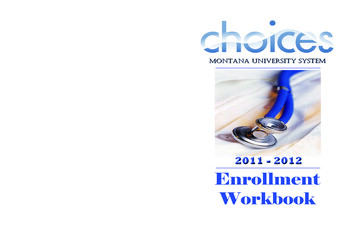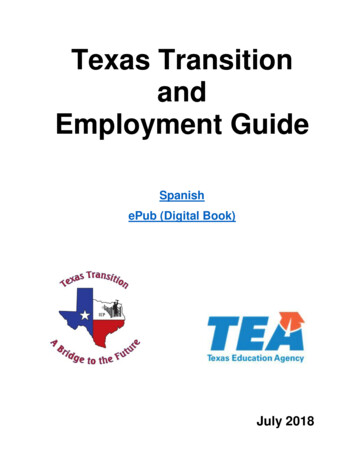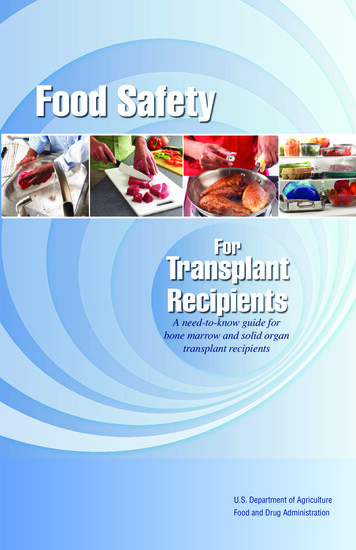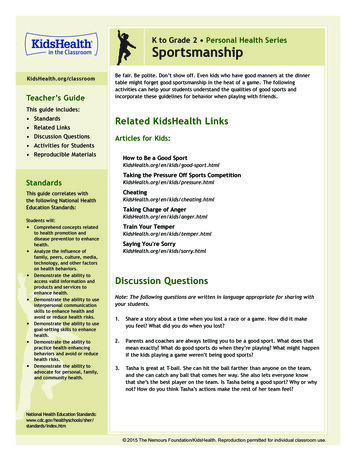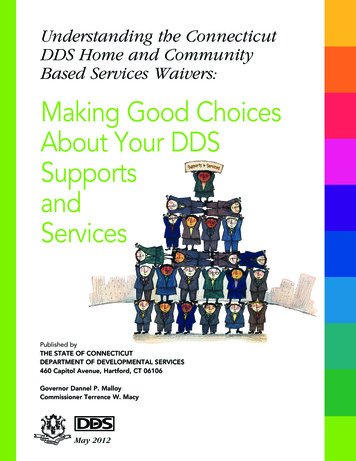
Transcription
Understanding the ConnecticutDDS Home and CommunityBased Services Waivers:Making Good ChoicesAbout Your DDSSupportsandServicesPublished byTHE STATE OF CONNECTICUTDEPARTMENT OF DEVELOPMENTAL SERVICES460 Capitol Avenue, Hartford, CT 06106Governor Dannel P. MalloyCommissioner Terrence W. MacyMay 2012
AcknowledgementsWe would like to thank the followingindividuals for their assistance in developingthe first edition material. Their assistancewas invaluable.Ken Cabral, Charlan Corlies, Terry Cote,Kathryn duPree, Sheryl Kemp, Beth McArthur,Greg McMahon, Beth Aura Miller, Laura Nuss,Dimitri Triantafillakis, Mickey Verno, Robin WoodThe update of this document has been fundedthrough a Connect-Ability Systems ChangeGrant provided by the Centers for Medicareand Medicaid Services.Thanks to Greg McMahon, Kevin McMahon,Beth Aura Miller, and Robin Wood for the2012 updates to this manual.
Making Good Choices About YourCT DDS Supports and ServicesDDS provides the opportunity for you to live and work in your communityand make choices about your supports and services. The first steps toobtaining supports from DDS are:1Become eligible for DDS Services2Complete a Level of Need Assessment Tool (LON) with yourcase manager so that the right level of funding allocation foryou can be determined3Become eligible for Medicaid Waiver Services bysaying that you want to live in the communityand not in an Intermediate Care Facilityfor the Mentally Retarded (ICF-MR) and byapplying for Medicaid Title XIX. (Rememberthat you must maintain Medicaid eligibilityto keep your services.)4Identify the supports that will best meetyour needs in your Individual Plan.5Budget funds allocated to you basedupon your LONOnce this is done, you and your familycan choose who you want to hire toprovide supports to you and how youwant to be involved in the management of yoursupports. DDS’s “portability process” explainedon page 15, also provides you with the option ofchanging your mind and changing your supports wheneverthe needs identified in your Individual Plan change, and aslong as you keep within your LON allocation!1
You Can Choose The Type ofService You Want To ReceiveYou decide what supports will best meet your needs!You can use your funds to purchase the supports that you think will besthelp you to accomplish the goals you have identified in your IndividualPlan. An extensive set of services and supports is available throughDDS’s Waivers. Your case manager can provide you with informationabout these services and help you to choose the supports that will workbest for you. You can also learn about these supports and services byreading the waiver service information found on the DDS website athttp://www.ct.gov.dds.You Can Choose How You Want YourSupports and Services To Be ManagedYou decide how much you want to be involved in directing your supports!You can also decide how much control you want to have in managing thesupports and services you receive. You can use your funds to purchasesupports from the qualified provider you choose, or you may use yourfunds to hire your own staff. You can choose from a number of differentoptions, including:2
Self-Direction: If you select this management option, you become theemployer of the people you choose to hire to provide supports to you.As the employer, you are responsible for the training, supervision, andmanagement of the people you hire. This option gives you the mostcontrol over your supports, but also the most responsibility.Agency With Choice: An Agency With Choice is an agency providerwho agrees to hire the individual you choose to provide supports to you.This individual becomes an employee of the provider agency and theagency agrees to help you train and manage the staff. This is a sharedmanagement model.Provider Agency: A provider agency is a traditional provider that is theemployer of the staff that will provide supports to you. The provideragency is responsible for hiring, training, and managing the staff thatsupport you.Or, you can use a combination of the above approaches to meet yourindividual needs!It is important that you think carefully about these hiring options. Eachoption provides you with a different amount of control, authority, andself-determination. Keep in mind that you can also change the way youarrange your supports and who delivers them at any time.3
Strategies You Can Use to Make Good ChoicesListed below are some things you can do and questions you can ask tohelp you make good decisions about your supports and services.General Things To Do: Become familiar with your rights as a consumer, and continue workingto learn even more. Learn terms that describe supports and services, such as IHS (individualhome supports), IL (independent living), CRS (community residentialsupports), CCH (community companion home), ISE (individual supportsEmployment, IDS (individual day supports), GSE (group supportedemployment), DSO (day support option), Personal Support, AdultCompanion, Respite, etc. Learn terms for how supports are paid for, such as Medicaid, HCBSWaivers, Comprehensive Waiver and Individual and Family Support(IFS) Waiver, Employment and Day Service Waiver. Talk to people who receive different types of supports, and who direct their own supports. Talk to people who have jobs and who are happywith the supports they receive tofind and keep employment. Learn various support optionsavailable in other parts of thestate, and with other providers. Visit homes, employmentservices and other servicesites, including those ofpeople who direct theirown supports. Decide what types of supports you want atthis time, and possiblyin the future.4
If you think you want to hireyour own staff: Become familiar with RewardingWork (www.rewardingwork.org) and Connect-Ability onlinerecruitment services.!FOR MORE INFORMATIONABOUT HIRING YOUR OWN STAFF,READ THE ORANGE DDS GUIDE“AN INTRODUCTION TOYOUR HIRING CHOICES”. Think about family memberswho live outside of your home,friends, neighbors and otherpeople you know who might begood people for you to hire.Which of these people can helpyou to expand your supportsystem? Talk to other people who hiretheir own staff and find outwhere and how they foundtheir employees. Become familiar with the FiscalIntermediary services and choosethe one that you think will workbest with you. Think about whether your casemanager, a DDS broker, orindependent broker, is the rightperson to help you hire andmanage employees. You canalso hire an IDGS Supervisorto assist you. A sk the regional SelfDetermination Directors, orother regional technicalassistance staff to provideyou with more detailedinformation about hiring andmanaging your own staff.5
If you think you want to hire an Agency with Choice,or a traditional provider: List possible providers; check for qualifications, qualified providerstatus, licensing citations Talk to others who receive supports from that provider and ask:?A re you satisfied, and do you have control overthe supports you receive? o support staff treat you with respect? DDo they listen to you? D id you participate in developing your plan?Does your plan say what is important to you?A re you kept informed about progress on your plan?About problems that arise?Have you had any problems with your support staff?What did you do? How did it work out? Did you choose where you live or did the provider?make this decision? Do you like where you live? What do you do for fun? Did you choose where you work or did the agency? make this decision? Do you get the support you need and?want both at home and at work? Are you getting the support you? need to pursue your future goals? Do you get the support you?need to try new things?6
Visit, or try out activities the provider offers.While you are there, look and listen to learn:?H ow does the agency view the people they support?Are they clients, consumers, or people? Do they use the person’s name when addressing him or her? Is the provider’s work based on preferences of the individual?Does the agency staff speak to the person, or defer to family or?paid staff?How does the provider respond to individual needs outside ofprograms they currently offer? Does the provider only talk about the services they currently?offer, or are willing to personalize their services for you?Do they ask the person what they want?Are they really trying to learn and understand?If you know what kind of supports, staff, or experiences youwant, does the provider listen?H ow much control do people or families have in hiring/scheduling of support staff? Ask someone you trust to review the agency’s policies7
Planning My Individual Future:? Describe your agency’s planning process.? How do you make sure your plans are person-centered? Do people attend all of their own meetings? Who decides who attends planning meetings? What if you are not chosen to be involved in my circle?C ould you support me if I did not want your participationat my planning meetings? Who can call or schedule a meeting? Will meetings ever be held without me? How will you help me prepare for my meetings?What happens if my circle and/or I make a decision that? conflicts with your decision?H ow do you ensure that supports agreed upon at planning? meetings are implemented?H ow do you ensure that things get done in the time we? decide upon?H ow will you provide the supports I need when I need them,? and change them when I need or want them changed? How do you promote “The DDS Principles of Self Determination”? ow many people have you? Hworked with who selfdirect their supports?How many of these peoplehave left your agency inthe last year? hat is your most creative? Wsupport situation?How did it happen?8
Schedule interviews with potential providers.Some questions you can ask providers include the following:Respect? How will you help me to have more control and dignity in my life? How will you help me learn about and exercise my rights?Safety? How do you ensure my personal safety? Do you do background checks, if so, what type? (National, State)? Do you check the abuse registry? How often? Describe the training your staff have.? What happens if someone gets hurt in my home? Can your staff assist me in taking my medication? Can you provide nursing services or help to obtain it? How are emergencies covered?I f something goes wrong with my supports, what back-up support? does the agency offer (direct support staff, behavioral, medical)?Working with people important to meH ow will you work with me, my family, my friends, and my circle? or network? Can people visit me at my home whenever they want?H ow would you help me to be involved with my family, friends,? co-workers, and others in my community?H ow can you help me keep the friends I have, find new friends,? and reestablish relationships?P rovide examples of how you have networked, assisted in? relationship building, etc.?9
Employment?W here are the people you support working and how long havethey worked there on average? How much money do they make at these jobs? Do people receive their paychecks from the agency/provider or? from the employer/company? What employment/career support services do you offer?consumers? How do you assess a person’s career interests, strengths? and skills? Does your agency provide a variety/range of supported?employment opportunities? Does this include individualized supported employment? (a job of ones own, hired by the company at competitive wages) ? Does your agency know how to help employers customize jobsso that people with intellectual disabilities have jobs that fit whopeople are and what they have to offer? How does your agency help individuals to use the natural supports?available to them at their place of employment? How many Job Developers/Job Coaches do you have and what is?their average caseload? What would be your response if I wanted to change jobs? How?would you support me to get a new job or to advance at my job? Will your agency help support me to learn and use alternative? types of transportation? Does your agency offer transportation? ? How do you measure consumer satisfaction? Do you have references from consumers, family members or?employers?10
Community Presence and Participation? How will you support me to get where I need or want to go? W ho decides the priority for transportation needs/requests? ill supports and/or transportation be available on weekends,? Wevenings, or holidays?W hat social, religious, ethnic, volunteer, or hobby groups dopeople you support attend? D escribe your relationships with your neighbors. hat relationships do you have with employers in your? Wcommunity?General /Administrative? D o you have any geographic limitations?W ill you work with other agencies or individuals to meet myneeds/wants? If so, give examples. an you break down your hourly rate? (% for direct services,? C% for administrative costs, etc.)? S pecify staff pay rates (residential vs. day)?I f I decide that I no longer want to use your services, whatwould I do? How will you assist me during a transition, and have you?done this before?M ay I see your personnel policies?Are the personnel policies flexible?DDS provides the opportunity for you tolive and work in the community and makechoices about your supports and services.11
Additional Questions for an Agency With Choice ill you hire someone I refer to your agency? W ill I have a choice of my support person(s) if a new staff is? Wneeded, and will I be a part of the interview process?How are absences covered? How do you provide consistentsupport or fill-in staff? C ould I meet and pick my own substitute staff? o I have a say in firing of my support staff? DWho has the final decision?H ow and when will I be able to develop the job descriptionand staff schedule? H ow will I be involved in training my staff? H ow will I give evaluations of my supports? H ow does your agency address complaints? an you give me examples of complaints from other consumers? Cand how they were resolved?12?If something goes wrong with my supports, what back-up supportdoes the agency offer (direct support staff, behavioral, medical)?H ow will you help me to become less dependent on you andyour services?
Hiring My Own StaffWhen hiring your own staff it’s important to ask the right questions in orderto choose the best staff to meet your needs. The book, “Find, Choose &Keep Great DSPs: A tool kit for people with disabilities looking for quality,caring and committed direct support professionals” is an excellent guidefor people who want to hire and manage their own staff.This guide provides ideas on how to find the right staff to meet your needs.It includes tips on recruiting, interviewing, selecting, training and managingstaff. You can get a copy of this book from your case manager.In SummaryThe questions in this guide are just examples of goodquestions you can ask to make sure you make goodchoices about your support services. Your case manager,DDS support broker, independent support broker orsomeone else you trust, can assist you to decide whatsupports are best for you. Remember you can changeyour mind about what you want. The important thingis to ask questions and learn as much as you can.13
And once you’ve made a decisionand are receiving supports . . .Things You Can Do to Get the MostOut of Your Supports Stay in regular contact with your case manager, support broker orindependent broker. Stay informed about your support options and your rights. Participate in your personal planning process as much as you can. Keep notes about your plan, what you want or need, what was decided,and when it will be done. Talk to others who receive supports, share ideas for working withyour provider.Learn About Your Choices! Be An Educated Consumer If you are not satisfied with your supports, tell people.Ask for help to improve your supports. If things really aren’t workingor meeting your expectations,shop around for yoursupports-interview otherproviders, you might find abetter match. Continue toexpect high quality. Thank the people who workfor you. Tell them when theydo things you appreciate. Take care of yourself and patyourself on the back for a jobwell done!14
Portability: You Really Do Have a Choice!“Portability” means that you have control over your supports and themoney used for the services you receive. You have the right to besatisfied with the services you receive, and if you are not satisfied youcan move your funds to another provider, or use your funding to purchasedifferent services. Your case manager, your DDS support broker, or yourindependent broker will help you if you want to change your services.Remember, when you do choose to change your service, you will wantto do so in a responsible way. It’s always best to try and maintain goodrelationships with others and leave on good terms.DDS Medicaid Waiver Services and Portabilityallow you to be creative in designing the supportsand services that will work best for you!Live Well!15
Notes:
Notes:
Published byTHE STATE OF CONNECTICUTDEPARTMENT OF DEVELOPMENTAL SERVICES460 Capitol Avenue, Hartford, CT 06106May 2012
changing your mind and changing your supports whenever the needs identified in your Individual Plan change, and as long as you keep within your LON allocation! DDS provides the opportunity for you to live and work in your community and make choices about your supports and services. The first steps to obtaining supports from DDS are: 1 2 3 4





